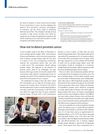January 2024 in “Biomedicines” The review shows that skin symptoms like chronic fungal infections, hair loss, and skin depigmentation are key for early detection and management of APECED.
 September 2023 in “Deleted Journal”
September 2023 in “Deleted Journal” Lifestyle changes improve reproductive function and hormonal balance in obese women with PCOS.
 August 2023 in “Medicina-lithuania”
August 2023 in “Medicina-lithuania” Abusing steroids can damage your heart, muscles, reproductive system, liver, skin, and brain, and may increase the risk of Alzheimer's disease.
[object Object]  September 2022 in “The American journal of dermatopathology/American journal of dermatopathology”
September 2022 in “The American journal of dermatopathology/American journal of dermatopathology” Sunscreen particles were not found in inflamed or fibrotic areas of skin in FFA patients, suggesting no direct link to the disease.
 May 2021 in “Bőrgyógyászati és venerológiai szemle”
May 2021 in “Bőrgyógyászati és venerológiai szemle” Some skin symptoms, like chilblain-like lesions, can help identify COVID-19 and show how the immune system is responding.
 April 2021 in “IntechOpen eBooks”
April 2021 in “IntechOpen eBooks” Androgens, male hormones, affect physical and mental functions, with a decrease leading to health issues like muscle loss, bone disease, and depression, and more research is needed on long-term effects and treatments.
 March 2021 in “Mansoura Veterinary Medical Journal /Mansoura Veterinary Medical Journal”
March 2021 in “Mansoura Veterinary Medical Journal /Mansoura Veterinary Medical Journal” Ringworm is a common, contagious fungal infection in dogs that can spread to humans and requires lengthy treatment.
 January 2020 in “Clinical dermatology open access journal”
January 2020 in “Clinical dermatology open access journal” Changing certain hairstyles can prevent worsening hair loss in Mexican women.
 December 2017 in “Revista Brasileira de Saúde Materno Infantil”
December 2017 in “Revista Brasileira de Saúde Materno Infantil” Pregnant women with Systemic Lupus Erythematosus have a higher risk of blood clotting problems.
 January 2017 in “Journal of Investigative Dermatology Symposium Proceedings”
January 2017 in “Journal of Investigative Dermatology Symposium Proceedings” The 2015 Hair Research Congress concluded that stem cells, maraviroc, and simvastatin could potentially treat Alopecia Areata, topical minoxidil, finasteride, and steroids could treat Frontal Fibrosing Alopecia, and PTGDR2 antagonists could also treat alopecia. They also found that low-level light therapy could help with hair loss, a robotic device could assist in hair extraction, and nutrition could aid hair growth. They suggested that Alopecia Areata is an inflammatory disorder, not a single disease, indicating a need for personalized treatments.
[object Object]  January 2017 in “Springer eBooks”
January 2017 in “Springer eBooks” The document concludes that Cutaneous Lupus Erythematosus has different forms, is influenced by genetic and environmental factors, and can be treated with various medications, but more targeted therapies are needed.
 May 2016 in “Cambridge University Press eBooks”
May 2016 in “Cambridge University Press eBooks” Eating disorders are serious, often undiagnosed conditions requiring early treatment, with anorexia being the most deadly and binge-eating the most treatable.
 August 2015 in “Free Radical Biology and Medicine”
August 2015 in “Free Radical Biology and Medicine” The study suggests that higher levels of SIRT1 and SIRT2 may improve overall cell health and aging processes.
 August 2015 in “Free Radical Biology and Medicine”
August 2015 in “Free Radical Biology and Medicine” The document concludes that the discussed biological mechanisms and potential therapies are not related to hair loss or hair growth.
 September 2014 in “Springer eBooks”
September 2014 in “Springer eBooks” The document concludes that breast pain should be managed with personalized treatment, starting with non-drug methods and progressing to medication if necessary, while considering side effects and patient needs.
 June 2011 in “Oncology times”
June 2011 in “Oncology times” New treatments are making advanced prostate cancer management more complex but also more hopeful.
 July 2008 in “Biomedical Imaging and Intervention Journal”
July 2008 in “Biomedical Imaging and Intervention Journal” New cancer treatments are more precise and less toxic, improving survival rates, but Asia faces challenges in adopting these advancements.
 February 2007 in “Lancet Oncology”
February 2007 in “Lancet Oncology” Using a single PSA level to decide on a prostate biopsy is not effective; a more personalized approach considering various factors is recommended.
 July 2003 in “British Journal of Dermatology”
July 2003 in “British Journal of Dermatology” Some skin conditions are associated with other serious diseases, and office microscopy may miss many fungal infections.
 July 2003 in “Journal of Cutaneous Medicine and Surgery”
July 2003 in “Journal of Cutaneous Medicine and Surgery” Certain drugs can cause lupus, stopping these drugs is the main treatment. NB-UVB phototherapy clears psoriasis faster when applied three times a week. Monoclonal antibodies and oral pimecrolimus are effective in treating psoriasis. Smoking and drinking are linked to psoriasis in men. No direct link between low iron and hair loss was found. Vaccines are effective against genital herpes and human papillomavirus type 16.

Penicillamine can cause taste problems due to copper loss, which can be fixed with copper or zinc supplements.
 1250 citations,
August 2021 in “Scientific Reports”
1250 citations,
August 2021 in “Scientific Reports” COVID-19 leaves 80% of patients with long-term symptoms like fatigue and headaches.
 336 citations,
August 2015 in “European Journal of Epidemiology”
336 citations,
August 2015 in “European Journal of Epidemiology” The Rotterdam Study found risk factors for elderly diseases, links between lifestyle and genetics with health conditions, and aimed to explore new areas like DNA methylation and sensory input effects on brain function.
 291 citations,
January 2014 in “The Scientific World Journal”
291 citations,
January 2014 in “The Scientific World Journal” Lichen Planus is a less common condition affecting skin and mucous membranes, with various types and associated risk factors, challenging to diagnose, significantly impacts life quality, and may have a risk of cancerous changes in oral lesions.
 263 citations,
February 2013 in “Wiley interdisciplinary reviews. Nanomedicine and nanobiotechnology”
263 citations,
February 2013 in “Wiley interdisciplinary reviews. Nanomedicine and nanobiotechnology” Polymeric nanoparticles show promise for treating skin diseases.
 260 citations,
July 2010 in “Cell”
260 citations,
July 2010 in “Cell” Mutations in the SRD5A3 gene cause a new type of glycosylation disorder by blocking the production of a molecule necessary for protein glycosylation.
 222 citations,
January 2005 in “Endocrine journal”
222 citations,
January 2005 in “Endocrine journal” Melatonin is important for skin health and protection, and can be made by the skin or applied to it.
 216 citations,
November 1999 in “Fertility and Sterility”
216 citations,
November 1999 in “Fertility and Sterility” Testing basal 17-HP levels is a good way to screen for nonclassic adrenal hyperplasia in women with high androgen levels.
 215 citations,
March 2011 in “Clinical Cancer Research”
215 citations,
March 2011 in “Clinical Cancer Research” Sorafenib is effective in treating Desmoid Tumor/Deep Fibromatosis.
 179 citations,
December 2004 in “Journal of The American Academy of Dermatology”
179 citations,
December 2004 in “Journal of The American Academy of Dermatology” Some postmenopausal women with frontal fibrosing alopecia stopped losing hair with finasteride treatment, hinting at a possible hormonal cause.




























